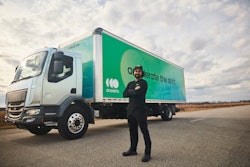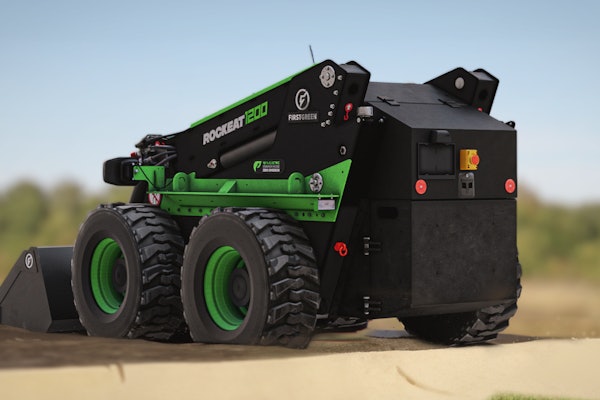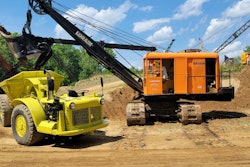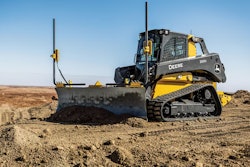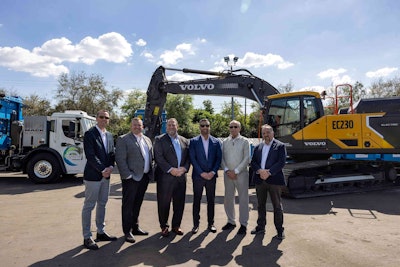
A Florida-based solid waste and recycling company recently received delivery of both on- and off-road electric equipment from a pair of Volvo Group companies.
Volvo Construction Equipment and Mack Trucks each delivered electric equipment to Coastal Waste & Recycling to help the company achieve its sustainability goals.
The company, which has 25 locations in Florida, Georgia, and South Carolina, is piloting the 22-metric-ton EC230 Electric excavator from Volvo CE and a Mack LR Electric Class 8 refuse vehicle.
“We are excited to add both pieces of equipment to our fleet,” said Brendon Pantano, CEO of Coastal. “As the first private hauler in Florida to invest in electric, we look forward to harnessing the strength of this strategic move to further elevate innovation in our operations.”
Both machines represent an example of the latest evolution of electrification of larger on and off-road equipment and the concept of building a mixed fleet to suit the company and application.
The EC230 Electric is a medium-sized excavator designed to offer the same performance as its diesel counterpart and the LR Electric is a heavy-duty truck with all the strength of comparable diesel-powered Mack LR refuse models.
“The shift to off-road electrification, especially in heavy construction machines, can’t be accomplished by one single team or company,” said Scott Young, head of region North America, Volvo Construction Equipment. “We’re grateful for the chance to partner with customers and other Volvo Group companies to advance sustainability in a variety of industries.”
Experts from both Volvo CE and Mack consulted with Coastal Waste on charging to help identify the ideal solution. Both vehicles will be fast-charged with the same mobile Heliox 50 kW charger provided by Volvo CE.
Coastal Waste & Recycling celebrated the e-mobility event with representatives of the two OEMs and local officials at their facility in Pompano Beach, Florida.
Volvo CE EC230 electric
Designed and built at the Volvo facilities in Changwon, South Korea, the EC230 electric excavator, which is not yet commercially available, has been tested by customers in South Korea, China, and elsewhere in North America over the past year.
It’s expected to be commercially available later in 2024.
According to Volvo CE, it offers the same features as the EC220, the diesel-powered conventional excavator in the same size class.
The facility where the EC230 Electric is being tested, located north of Miami, is where Coastal receives and sorts recyclable materials. The excavator will be performing the same work as its equivalent diesel model the EC220EL, feeding material into a sorting line.
“Coastal Waste & Recycling has been a great partner and has always been interested in any new technology they can incorporate to drive efficiency and excellence throughout their operations,” said Martin Mattsson, director of key account sales – waste and recycling, Volvo CE. “Testing this electric excavator directly against its conventional equivalent will teach us a lot.”
The most significant difference between the two excavators is the emissions. The EC230 electric is also quieter, and the overall vibrations are reduced. In addition, operators will have instant torque from the electric motor rather than the typical slight delay with diesel.
According to Volvo CE, the EC230 Electric is expected to achieve a 60 to 70% reduction in energy running costs compared with the EC220.
The EC230 E is equipped with four 66-kilowatt lithium-ion battery packs that enable the operator to work four to five hours in general-purpose applications. Volvo CE says with a high-power fast charge on a lunch hour, the machine should last through a full eight-hour shift.
Hydraulic pumps are identical to those for the EC220, providing the same performance, except they are now driven by an electric motor. Electricity is only being consumed when the operator needs to work with the machine so idle time does not count against energy consumption.
 Coastal Waste & Recycling recently took delivery of its first battery-electric refuse vehicle, the Mack LR Electric model. Mack executives handed over the vehicle during an e-mobility event with the company, Volvo Construction Equipment, Nextran Truck Centers and local officials. Pictured left to right is Darren Jane, Mack senior district manager – Southeast, Jonathan Randall, president of Mack Trucks North America, Brendon Pantano, CEO of Coastal Waste & Recycling, Tyler Ohlmansiek, Mack director of e-mobility sales, Dennis McDaniel, Mack Regional Vice President – Southeast, and Ryan Saba, Mack e-mobility energy solutions manager.Mack trucks
Coastal Waste & Recycling recently took delivery of its first battery-electric refuse vehicle, the Mack LR Electric model. Mack executives handed over the vehicle during an e-mobility event with the company, Volvo Construction Equipment, Nextran Truck Centers and local officials. Pictured left to right is Darren Jane, Mack senior district manager – Southeast, Jonathan Randall, president of Mack Trucks North America, Brendon Pantano, CEO of Coastal Waste & Recycling, Tyler Ohlmansiek, Mack director of e-mobility sales, Dennis McDaniel, Mack Regional Vice President – Southeast, and Ryan Saba, Mack e-mobility energy solutions manager.Mack trucks
Mack LR Electric
Pantano said he ordered the Mack LR Electric refuse vehicle because of the company’s long-standing relationship with Mack and Mack’s reputation in the refuse industry.
“Mack is proud to be partnering with Coastal Waste & Recycling in their journey toward electrification,” said Jonathan Randall, president of Mack Trucks North America. “Coastal’s commitment to sustainability is evident through their efforts to bring battery-electric vehicles to serve their customers in southern Florida, and we appreciate their enthusiasm for reducing GHG emissions and environmental care.”
Equipped with an automated side loader Coastal Waste & Recycling’s electric truck will operate in residential and certain specialized commercial applications. Mack and Coastal Waste & Recycling worked together to develop favorable routing to ensure the refuse truck can complete a full day’s work based on the application needs.
The Mack LR Electric offers a standard 376 kWh total battery capacity for 42% more energy and an increased range between charges. According to the company, the twin electric motors produce 448 continuous horsepower and 4,501 lb.-ft. of peak torque output from zero RPM.
Four NMC (Nickel Manganese Cobalt Oxide) lithium-ion batteries, charged through a 150-kW charging system, power the vehicle and all onboard accessories through 12V, 24V, and 600V circuits.
Also, the truck’s two-stage regenerative braking system helps recapture energy from the hundreds of stops the vehicle makes each day with an increasing load.






